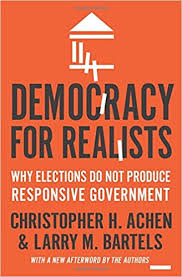Realistic Democracy From Political Scientists
My education as an historian carried with it appreciation for – as well as distrust of – political science. When historians congregate, political science often gets short shrift. The complaints are more than just sniffing at the math, too (“Formulas don’t explain history!). Political science often looks at political behavior through a lens that historians have difficulty understanding or appreciating. At the same time, many of us trained in history often cast a covetous glance at the political scientists. They are great at testing the counterfactual, at looking across time and location, and at advancing very useful arguments. Whether we admit it or not, we often borrow from them.
 Democracy for Realists: Why Elections Do Not Produce Responsive Government, by Christopher H. Achen and Larry M. Bartels is the kind of political science that historians admire. It is clearly written, informative, and a powerful corrective to those in the field that believe that political science has all the answers (not that many do . . . ). Also, Achen and Bartels do an outstanding job with their history. Their examples are well-researched and well written.
Democracy for Realists: Why Elections Do Not Produce Responsive Government, by Christopher H. Achen and Larry M. Bartels is the kind of political science that historians admire. It is clearly written, informative, and a powerful corrective to those in the field that believe that political science has all the answers (not that many do . . . ). Also, Achen and Bartels do an outstanding job with their history. Their examples are well-researched and well written.
The book explains common theories about how democracies work and how voters are supposed to make decisions. Are they making rational choices? Or using heuristics? Or perhaps they engage in retrospective voting, rewarding or punishing candidates and parties for actions? Theorists have been outlining these and other theories for decades. Unfortunately, when Achen and Bartels look at American history and the data, none of these theories hold up. They don’t really explain anything particularly well. It is a problem for political science and for all of us, today, thinking about how our democratic institutions work.
It turns out the social identity and party identity, with all its irrationality, best explains voter behavior. The arguments set out in the book are solid and difficult to refute. Voters actually change their priorities in order to align their thinking with that of their party. When push comes to shove, democracies rest on less than rational, but organized, group behavior. More telling still, when parties are relatively balanced, election results can depend upon lies, distortions and plain bad information. Democracy might be the best worst system of government. Achen and Bartels are very effective in showing just how “worst” it can be.
It’s sobering. The authors are able to cover a great deal of ground, theoretical and historical, quickly and convincingly. The lack of rationality is also something that most political historians realize when digging deep into American history. It may not be news – but it is extremely important. And for those of us who are paying close attention to recent politics, Democracy for Realists is a very helpful addition to the bookcase. It explains quite a lot.
David Potash